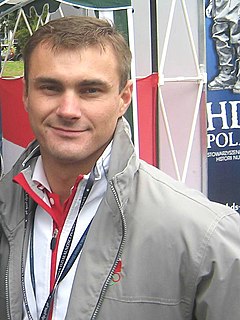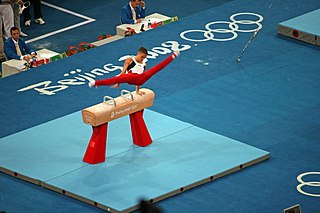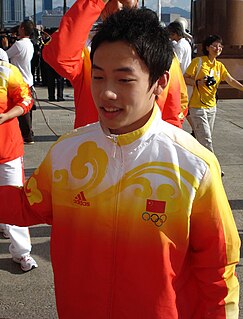
The men's parallel bars competition was one of eight events for male competitors of the artistic gymnastics discipline contested in the gymnastics at the 2004 Summer Olympics in Athens. The qualification and final rounds took place on August 14 and August 23 at the Olympic Indoor Hall. There were 81 competitors from 31 nations, with nations competing in the team event having up to 5 gymnasts and other nations having up to 2 gymnasts. The event was won by Valeriy Honcharov of Ukraine, the nation's second victory in the parallel bars. Hiroyuki Tomita took silver, putting Japan above the Soviet Union on the all-time medal table for the event. Li Xiaopeng of China became the seventh man to win multiple parallel bars medals with his bronze adding to his 2000 gold.

The men's pommel horse competition was one of eight events for male competitors of the artistic gymnastics discipline contested in the gymnastics at the 2004 Summer Olympics in Athens. The qualification and final rounds took place on August 14 and August 22 at the Olympic Indoor Hall. There were 80 competitors from 31 nations, with nations competing in the team event having up to 5 gymnasts and other nations having up to 2 gymnasts. The event was won by Teng Haibin of China, the nation's first victory in the pommel horse since 1984 and second overall. Marius Urzică of Romania took silver to become the first man to win three medals on the pommel horse. Takehiro Kashima put Japan back on the pommel horse podium for the first time since 1988 with his bronze.

The men's rings competition was one of eight events for male competitors of the artistic gymnastics discipline contested in the gymnastics at the 2004 Summer Olympics in Athens. The qualification and final rounds took place on August 14 and August 22 at the O.A.C.A. Olympic Indoor Hall. There were 77 competitors from 28 nations, with nations competing in the team event having up to 5 gymnasts and other nations having up to 2 gymnasts. The event was won by Dimosthenis Tampakos of Greece, the nation's first victory in the rings since 1896 and second overall. Yordan Yovchev of Bulgaria took silver, while Jury Chechi of Italy earned bronze. All three men had previously won a medal in the event; they were the 9th, 10th, and 11th men to win multiple rings medals.

The men's vault competition was one of eight events for male competitors of the artistic gymnastics discipline contested in the gymnastics at the 2004 Summer Olympics in Athens. The qualification and final rounds took place on August 14 and August 23 at the Olympic Indoor Hall. There were 79 competitors from 30 nations, with nations competing in the team event having up to 5 gymnasts and other nations having up to 2 gymnasts. The event was won by Gervasio Deferr of Spain, the third man to successfully defend an Olympic title in the vault and sixth man to win multiple medals of any color. Latvia and Romania each earned their first men's vault medals, with Evgeni Sapronenko's silver and Marian Drăgulescu's bronze, respectively.

The men's vault competition at the 2008 Summer Olympics was held on August 9 and 18 at the Beijing National Indoor Stadium. The eight competitors with the highest scores in qualifying, among the gymnasts electing to make two vaults, proceeded to the men's vault finals. There, each gymnast performed two vaults; the scores from the final round determined final ranking. There were 16 competitors from 13 nations that made a second vault attempt. The event was won by Leszek Blanik of Poland, the nation's first victory in the men's vault. Blanik was the seventh man to win multiple medals in the event, adding to his 2000 bronze. France earned its first medal in the event with Thomas Bouhail's silver. Anton Golotsutskov of Russia took bronze, putting the nation back on the podium after a one-Games absence.

The men's pommel horse competition at the 2008 Summer Olympics was held on August 17 at the Beijing National Indoor Stadium. The eight competitors with the highest scores in qualifying proceeded to the men's pommel horse finals. There, each gymnast performed again; the scores from the final round determined the final ranking. There were 76 competitors from 27 nations that competed on the pommel horse, with nations in the team event entering up to 5 gymnasts while other nations could enter up to 2. The event was won by Xiao Qin of China, the nation's second consecutive and third overall victory in the pommel horse. The other two medals went to nations that had never earned a medal in the event before: Filip Ude of Croatia took silver while Louis Smith of Great Britain finished with bronze.

The men's parallel bars competition at the 2008 Summer Olympics was held on August 9 and 19 at the Beijing National Indoor Stadium. The eight competitors with the highest scores in qualifying proceeded to the men's parallel bars finals. There, each gymnast performed again; the scores from the final round determined the final ranking. There were 75 competitors from 27 nations that competed on the parallel bars, with nations in the team event entering up to 5 gymnasts while other nations could enter up to 2. The event was won by Li Xiaopeng of China, the first man to win three medals in the parallel bars as well as the first man to win two non-consecutive gold medals in the same apparatus. Yoo Won-Chul of South Korea took silver. Anton Fokin won Uzbekistan's first parallel bars medal in its debut as an independent nation.

The men's horizontal bar competition at the 2008 Summer Olympics was held on 9 and 19 August at the Beijing National Indoor Stadium. The eight competitors with the highest scores in qualifying proceeded to the men's horizontal bar finals. There, each gymnast performed again; the scores from the final round determined final ranking. There were 76 competitors from 27 nations that competed on the horizontal bar, with nations in the team event entering up to 5 gymnasts while other nations could enter up to 2. The event was won by Zou Kai of China, the nation's first victory in the horizontal bar. Jonathan Horton won silver, the United States' second consecutive Games with a silver medalist in the horizontal bar. Germany's Fabian Hambüchen won the first of his three medals in the event with bronze.

The men's vault competition was one of eight events for male competitors in artistic gymnastics at the 2000 Summer Olympics in Sydney. The qualification and final rounds took place on September 16 and 25 at the Sydney SuperDome. There were 80 competitors from 31 nations; nations competing in the team event could have up to 5 gymnasts in the vault, while other nations could have up to 2 gymnasts. The event was won by Gervasio Deferr of Spain, the nation's first medal in the men's vault. Poland also earned its first medal in the event, with Leszek Blanik's bronze. Silver went to Alexei Bondarenko of Russia.

The men's rings competition was one of eight events for male competitors in artistic gymnastics at the 2000 Summer Olympics in Sydney. The qualification and final rounds took place on September 16 and 24 at the Sydney Super Dome. There were 78 competitors from 29 nations; nations competing in the team event could have up to 5 gymnasts in the vault, while other nations could have up to 2 gymnasts. The event was won by Szilveszter Csollány of Hungary, the nation's first victory in the rings. Csollány, who had taken silver in 1996, became the eighth man to win multiple medals in the event. The silver this time went to Dimosthenis Tampakos of Greece—the first medal in the event for a Greek gymnast since 1896. Yordan Yovchev earned Bulgaria's first rings medal since 1960 with his bronze.

The men's rings competition was one of eight events for male competitors in artistic gymnastics at the 1996 Summer Olympics in Atlanta. The qualification and final rounds took place on July 20, 22 and 28th at the Georgia Dome. There were 102 competitors from 31 nations, with nations in the team event having up to 7 gymnasts and other nations having up to 3 gymnasts. The event was won by Jury Chechi of Italy, the nation's first victory in the men's rings since 1924 and first medal in the event since 1964. There was a tie for silver, between Szilveszter Csollány of Hungary and Dan Burincă of Romania. It was the best result so far for either nation; Romania had previously had a bronze medalist but this was Hungary's first trip to the podium in the rings.

The men's rings competition was one of eight events for male competitors in artistic gymnastics at the 1992 Summer Olympics in Barcelona. The qualification and final rounds took place on July 27, 29 and August 2 at the Palau dels Esports de Barcelona. There were 93 competitors from 25 nations, with nations in the team event having 6 gymnasts while other nations could have up to 3 gymnasts. The event was won by Vitaly Scherbo of the Unified Team, the fourth time in five Games that a Soviet or former Soviet gymnast won the rings. Li Jing of China earned silver. There was a tie for third, with Andreas Wecker of Germany and Li Xiaoshuang of China each receiving bronze medals. It was the first medal for unified Germany since 1936, though East Germany had won gold and bronze in 1988.

The men's vault competition at the 2012 Summer Olympics in London, United Kingdom, was held at the North Greenwich Arena 1 on 6 August. There were 17 competitors from 14 nations. The event was won by Yang Hak-Seon of South Korea, the nation's first victory in the men's vault and first medal since 1996. Denis Ablyazin of Russia took silver, while Igor Radivilov earned Ukraine's first medal in the event as an independent nation.

The men's pommel horse in artistic gymnastics at the 2012 Olympic Games in London was held at the North Greenwich Arena on 28 July and 5 August. There were 69 competitors from 32 nations. Krisztián Berki from Hungary won the gold medal. It was Hungary's first victory in the pommel horse since 1988 and fifth overall, tying the Soviet Union for most all-time. Great Britain's Louis Smith and Max Whitlock won silver and bronze respectively. Smith, who had won bronze in 2008, was the 10th man to win multiple medals in the event. It was the first time since 1984 that one nation earned multiple medals in the pommel horse.

The men's rings competition at the 2012 Summer Olympics in London, United Kingdom was held at the North Greenwich Arena 1 on 28 July and 6 August. There were 68 competitors from 31 nations. The event was won by Arthur Zanetti of Brazil, the nation's first medal in the men's rings. 2008 winner Chen Yibing of China was not successful in repeating as Olympic champion, but earned silver to become the 12th man to win multiple medals in the event. Matteo Morandi of Italy took bronze.

The men's parallel bars competition at the 2012 Summer Olympics in London, United Kingdom was held at the North Greenwich Arena 1 on 28 July and 7 August. There were 71 competitors from 33 nations. The event was won by Feng Zhe of China, the nation's second consecutive victory in the parallel bars and third overall. Marcel Nguyen's silver was the first medal for united Germany in the event since 1936 and the first for any German gymnast in the parallel bars since 1988. Hamilton Sabot earned France's first parallel bars medal with his bronze.

The men's horizontal bar competition at the 2012 Summer Olympics in London, United Kingdom was held at the North Greenwich Arena 1]] on 28 July and 7 August. There were 70 competitors from 33 nations. The event was won by Epke Zonderland of the Netherlands, the nation's first victory in the horizontal bar. Fabian Hambüchen of Germany took silver, while Zou Kai of China earned bronze. Hambüchen and Zou, bronze and gold medalists respectively in 2008, were the 11th and 12th men to win multiple medals in the event.

The men's rings competition at the 2016 Summer Olympics was held at the HSBC Arena on 6 and 15 August. There were 70 competitors from 34 nations. The event was won by Eleftherios Petrounias of Greece, the nation's first medal in the men's rings since 2004. Defending champion Arthur Zanetti of Brazil finished second, making him the 13th man to win multiple medals in the event. Denis Ablyazin earned Russia's first post-Soviet medal in the event with his bronze.

The men's rings event at the 2020 Summer Olympics was held on 24 July and 2 August 2021 at the Ariake Gymnastics Centre. Approximately 70 gymnasts from 35 nations competed on rings in the qualifying round.

The men's horizontal bar event at the 2020 Summer Olympics was held on 24 July and 3 August 2021 at the Ariake Gymnastics Centre. Approximately 70 gymnasts from 35 nations competed on the horizontal bar in the qualifying round.














